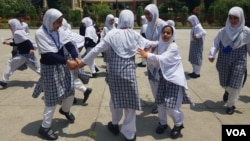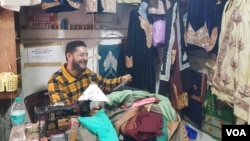Welcomed as co-religionists in India’s most populous Muslim-majority region, the community of about 1,500 has preserved its culture and traditions while endearing itself to its neighbors by, among other things, opening restaurants serving up an increasingly popular cuisine.
Younger Kashmiris have become particularly fond of Tibetan dishes such as Momos, a type of stuffed steamed dumpling, according to Ahmad Kamal Zarief, manager of the Lhasa Restaurant on Srinagar’s Boulevard Road.
“Most of our customers are Kashmiris,” Zarief told VOA. He explained how important the restaurant had been to his father, Abdul Rehman Zarief, who opened the establishment in 1976.
“My father treasured his Tibetan roots,” Zarief fondly recalled. “Tibetan cuisine served as a gateway to his ancestral village, connecting him to his family and childhood memories. Through this restaurant, my father found solace in reliving those cherished moments.”
For the Tibetan Muslims, who fled after Chinese troops seized control of Lhasa following a failed uprising against Beijing in 1959, the journey to Kashmir was not so much an exodus as a return to their origins, according to Amanullah Malik, a former principal of the Tibetan Public School in Srinigar.
Centuries ago, Malik explained, the community’s ancestors moved from Kashmir to Lhasa, where they married Tibetan women, learned the Tibetan language and formed a distinct community. “We enjoyed the freedom to practice our religion, build our mosque and conduct business without any hindrance,” he said.
Since arriving in Kashmir, most of the newcomers have settled in Srinagar near the 18th century Hari Parbat Fort — now a flourishing neighborhood marked by numerous Tibetan restaurants and other signs of the residents’ cultural roots.
These include embroidery shops like that run by Mohmmad Yousuf Dalba, who told VOA it takes him three days to complete the needlework on a traditional women’s cloak with its shimmering gold and silver threads, to be worn for important ceremonies.
Though not common, intercommunity marriages have occurred between Tibetans and Kashmiris. Nighat Qazi, in her 30s, married a Tibetan man and has three children.
In 2011, when Qazi married outside her community, she faced resistance from her family. However, Qazi said, “Now my family and entire clan are happy and appreciate my decision,” adding, “There should be more intercommunity marriages.”
Younger Tibetans appears to have relinquished the hope of returning to their ancestral homeland, which is now under Chinese control. This sentiment is reflected in their way of life, as they increasingly adopt the customs and language of the Kashmiri people.
At the Tibetan Public School, where the Dalai Lama delivered a speech in 2012, most of the students are local Kashmiris. Seventh grader Fatima Tramboo told VOA she enjoys taekwondo but her parents want her to be a doctor. “I feel comfortable sharing these things with my Kashmiris friends and most of my friends are Kashmiris,” Tramboo said.
“We will always reside in Kashmir, and that is an undeniable reality,” acknowledged Malik, the former principal. “Just observe the upcoming generation. They are unaware of being sent away. While they may possess Tibetan heritage, their behaviors, language, and preferences are distinctly Kashmiri.”
Nevertheless, maintained Zarief, the Tibetans have preserved their national language. “At home, we speak in our language, and it is one of the finest dialects of the Tibetan language,” he said.
Despite more than six decades living in Kashmir, the Tibetans received citizenship and the right to remain permanently only after the federal Indian government revoked the region’s semi-autonomous status in 2019.
That decision infuriated many in the region, leading to a harsh security clampdown and attacks by militants on some non-local communities, but there were no reports of any Tibetans being harmed or troubled.
“Throughout our existence in Kashmir, we have never been harassed. Kashmiris are great hosts and have treated us well,” Zarif said.







